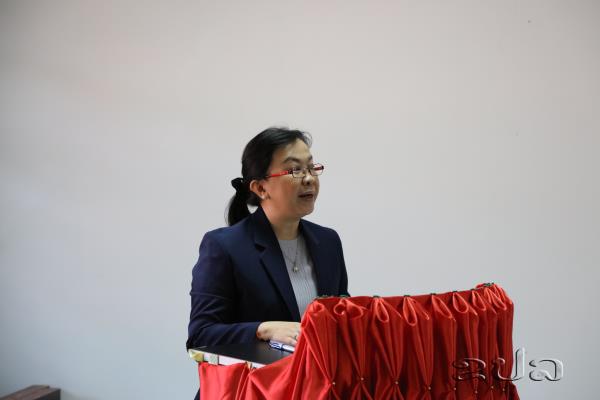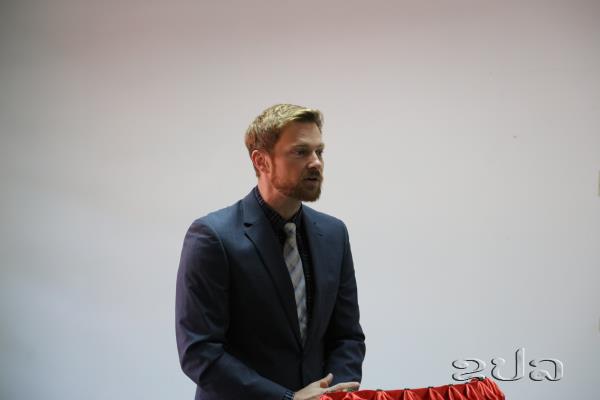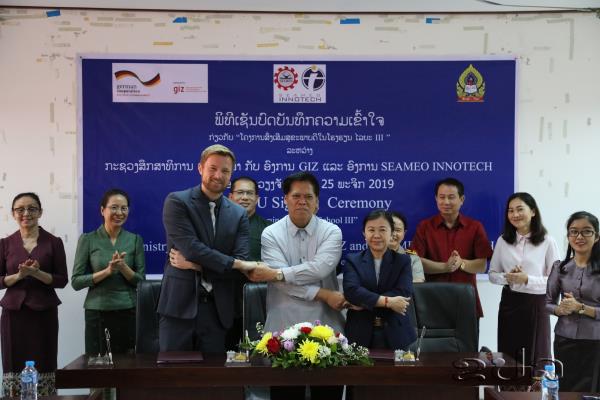KPL
(KPL) The Deutsche Gesellschaft für Internationale Zusammenarbeit (GIZ) has continued to support the Lao children for the “Fit for school Programme”, currently entering its third phase.

(KPL) The Deutsche Gesellschaft für Internationale Zusammenarbeit (GIZ) has continued to support the Lao children for the “Fit for school Programme”, currently entering its third phase.
Fit for School’s third phase will last until November 2021 to support the establishment of a WASH in schools monitoring system for improved resource planning and capacity building across the country.
The Memorandum of Understanding for the third phase of the successful Fit for School program in the Lao PDR was signed by Mr. Silinthone Sacklokham, Acting Director General, Department of External Relations, Ministry of Education and Sports, Dr. Ramon C. Bacani, Director of the Regional Center for Educational Innovation and Technology of the South-East Asian Ministers of Education Organization (SEAMEO INNOTECH) and Mr Alexander Winkscha, Regional Coordinator for Cambodia and the Lao PDR, GIZ Regional Fit for School Programme.
“Since 2011, GIZ in partnership with SEAMEO INNOTECH has been supporting the Ministry of Education and Sports in the Lao PDR to implement the Fit for School Program for 2 phases, which started in 22 model schools in four districts of Vientiane Capital and expanded further to 170 schools across the country,” said Mr. Silinthone Sacklokham.

“The programme has provided strengthen the implementation of water, sanitation and hygiene programme in primary schools to promote school's daily routine including washing hands with soap, tooth brushing, or improving access to clean water and other healthcare to address appropriate sanitation. By having close and continuous collaboration among GIZ, SEAMEO INNOTECH and MoES, the programme has been receiving good results, we could evidently see the improvement in many aspects such as: reducing school absent and improving the learning outcome of students because of having better healthcare and clean school environment so they can get the most out of their education,” added Dr. Silinthone Sacklokham.
“The Regional Fit for School Programme is implemented by GIZ in the Philippines, the Lao PDR, Cambodia and Indonesia. The programme, commissioned by the German Ministry for Economic Cooperation and Development (BMZ), has been supporting the MoES of the Lao PDR since December 2011,” said Mr Alexander Winkscha.
“In the Lao PDR, the programme has started out in 22 public primary schools in Vientiane Capital. Up until today, this number has increased to over 2,700 primary schools nationwide, benefitting over 235,000 children in the Lao PDR. In addition, over 140 secondary and more than 500 pre-primary schools have also started to implement the programme,” said Mr Alexander Winkscha.

The Fit for School approach strengthens school-based management to support the
Implementation of water, sanitation and hygiene programmes, including daily group
handwashing with soap and tooth brushing with fluoride toothpaste and regular deforming, to address high-impact diseases. Combined with improved access to clean water, washing facilities and appropriate sanitation, key determinants of health are ad- dressed in a single intervention package. Fit for School focuses on measures that are simple, scalable, sustainable and integrated into the education system.
KPL